
The Marvelettes were an American girl group that achieved popularity in the early to mid-1960s. They consisted of schoolmates Gladys Horton, Katherine Anderson, Georgeanna Tillman, Juanita Cowart, and Georgia Dobbins, who was replaced by Wanda Young prior to the group signing their first deal. They were the first successful act of Motown Records after the Miracles and its first significantly successful female group after the release of the 1961 number-one single, "Please Mr. Postman", one of the first number-one singles recorded by an all-female vocal group and the first by a Motown recording act.
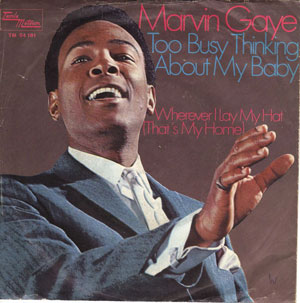
"Too Busy Thinking About My Baby" is a Motown song written by Norman Whitfield, Barrett Strong, and Janie Bradford. The song was first recorded by The Temptations as a track on their 1966 album Gettin' Ready. Eddie Kendricks sings lead on the recording, which was produced by Whitfield. Jimmy Ruffin also recorded a version with The Temptations providing background vocals in 1966. It remained unreleased until 1997.

"Please Mr. Postman" is a song written by Georgia Dobbins, William Garrett, Freddie Gorman, Brian Holland and Robert Bateman. It is the debut single by the Marvelettes for the Tamla (Motown) label, notable as the first Motown song to reach the number-one position on the Billboard Hot 100 pop singles chart. The single achieved this position in late 1961; it hit number one on the R&B chart as well. "Please Mr. Postman" became a number-one hit again in early 1975 when The Carpenters' cover of the song reached the top position of the Billboard Hot 100. "Please Mr. Postman" has been covered several times, including by the British rock group the Beatles in 1963. The 2017 song "Feel It Still" by Portugal. The Man draws on "Please Mr. Postman" and includes a credit for Brian Holland.
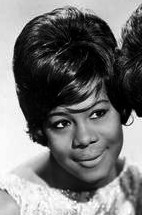
Gladys Catherine Horton was an American R&B and pop singer, notable for being the founder and lead singer of the all-female vocal group the Marvelettes, the first successful Motown girl group.

"Honey Chile" is a 1967 single by Motown girl group Martha Reeves and the Vandellas on the Gordy label. Produced by Richard Morris and written by Morris and Sylvia Moy, This was the first single to bill Martha Reeves by her full name, as opposed to simply "Martha" and the Vandellas.
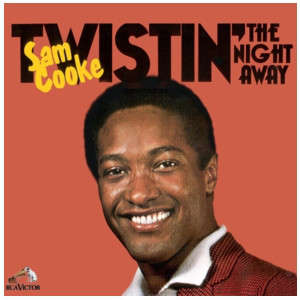
"Twistin' the Night Away" is a song written and recorded by Sam Cooke. It was recorded on 18 December 1961 and released as a single in 1962. It became very popular, charting in the top ten of both the Billboard Hot 100 (#9) and Billboard's R&B chart (#1). "Twistin' the Night Away" was successful overseas as well, peaking at #6 on the UK Singles Chart.

"Superwoman " is a 1972 soul track by Stevie Wonder. It was the second track on Wonder's Music of My Mind album, and was also released as the first single. The song reached a peak of number 33 on the Billboard Hot 100 chart.
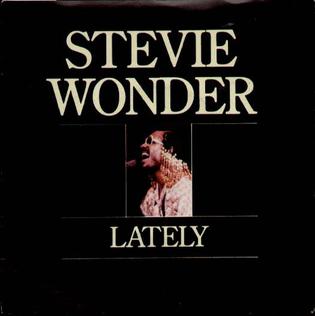
"Lately" is a song by American singer Stevie Wonder recorded for his album Hotter than July (1980). The song reached number three in the United Kingdom, and was later covered by R&B group Jodeci and released as a promotional single for the live album Uptown MTV Unplugged in June 1993, which reached number one on the R&B charts and the top 5 on the Billboard Hot 100.

"I Really Love You" is a song written by Leroy Swearingen, and originally recorded by his Steubenville, Ohio, vocal group called The Stereos in 1961.

"Don't Mess with Bill" is a million-selling Gold-certified 1966 single recorded by The Marvelettes for Motown Records' Tamla label. Written and produced by Smokey Robinson, "Don't Mess with Bill" features a lead vocal by Wanda Young. The single peaked at number seven on the Billboard Hot 100 in February 1966, and at number three on Billboard's R&B singles chart. "Don't Mess with Bill" was the Marvelettes' final Top 10 single.
"You" is a 1967 single released by American singer Marvin Gaye on the Tamla label.

"Beechwood 4-5789" is a song written by Marvin Gaye, William "Mickey" Stevenson and George Gordy. It was a 1962 hit single for the Motown girl group The Marvelettes on Motown's Tamla subsidiary record label. The song became a hit again when it was covered by the pop duo The Carpenters in 1982.
"What's So Good About Goodbye" was a 1961 hit single recorded by R&B group The Miracles for Motown Records' Tamla label, later included on their 1962 album I'll Try Something New. The single was the Miracles’ second Top 40 Pop hit, peaking at number 35 on the Billboard Hot 100 in the United States during the winter of 1962, and a Top 20 R&B hit as well, peaking at number 16 on Billboard's R&B singles chart.
"634-5789 " is a soul song written by Eddie Floyd and Steve Cropper. It was first recorded by Wilson Pickett on December 20, 1965 and included on his 1966 Atlantic Records album The Exciting Wilson Pickett with backing vocals by Patti LaBelle and the Blue Belles. The single reached number 1 on the Billboard Hot Rhythm & Blues Singles chart and number 13 on the Hot 100 singles chart.
"Too Many Fish in the Sea" is a 1964 hit song recorded by Motown singing group The Marvelettes. It was the group's first top 40 pop hit in almost a year, reaching #25 on the Billboard Hot 100, and was one of the first hit singles written by Norman Whitfield; Eddie Holland also had a hand in the writing. "Too Many Fish..." was also Whitfield's first produced single.
"Playboy" is a song composed by Brian Holland, Robert Bateman, Mickey Stevenson and singer Gladys Horton, lead vocalist of the Motown singing group The Marvelettes, who recorded the song and released it as a single on Motown's Tamla imprint in 1962. The single, led by Horton, is about a man who fools around with a lot of women and the woman who narrates the story warns him to stay away from her due to the stories she heard of him "running around with every woman in town". Horton is helped out in the song by her Marvelettes cohorts Wanda Young, Georgeanna Tillman, Katherine Anderson & Juanita Cowart. This was released as the third single by the Marvelettes and was their second top ten pop hit reaching number seven on the charts while reaching number four on the R&B chart.
"I'll Keep Holding On" is a song composed by Mickey Stevenson and Ivy Jo Hunter and recorded by Motown singing group The Marvelettes, who released the single on the Tamla imprint in 1965. Peaking at #34 on the Billboard Hot 100, the single returned the group to the top forty after a year recording songs that performed below the top forty. This was among the first A-side singles that longtime Marvelettes member Wanda Young sung lead on. Before 1965, the majority of the leads in Marvelettes songs had belonged to original member Gladys Horton. The single features a woman determined to win the love of an unknowingly conquest telling him that she'll convince him to love her "until my will to resist is gone". Her Marvelettes band mates Gladys Horton and Katherine Anderson egg her on with her ad-libbing "oh yeah/sho' nuff" in the bridge leading up to the chorus. The single was covered by British mod-pop act, The Action in 1966. It then returned across the Atlantic in 1998 to be released on Mink Rat or Rabbit by the Detroit Cobras.

"When You're Young and in Love" is a song composed by Van McCoy which first became a Top 40 hit single for the Marvelettes in 1967: a remake by the Flying Pickets would reach the UK Top Ten in 1984.
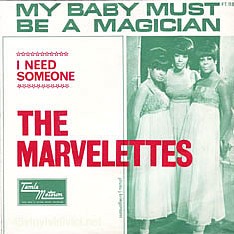
"My Baby Must Be a Magician" is a 1967 song written and produced by Smokey Robinson and recorded by the Marvelettes.
"Locking Up My Heart" is a 1963 single released by Motown girl group The Marvelettes on the Tamla record label.













